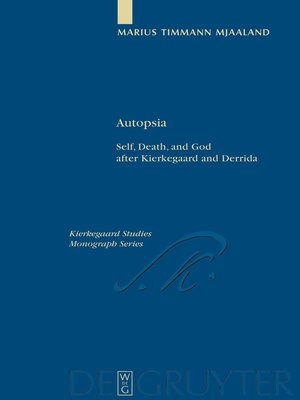Autopsia
ebook ∣ Self, Death, and God after Kierkegaard and Derrida · Kierkegaard Studies. Monograph Series
By Marius Timmann Mjaaland

Sign up to save your library
With an OverDrive account, you can save your favorite libraries for at-a-glance information about availability. Find out more about OverDrive accounts.
Find this title in Libby, the library reading app by OverDrive.



Search for a digital library with this title
Title found at these libraries:
| Library Name | Distance |
|---|---|
| Loading... |
There are certain things that can be explained and certain things that cannot be explained. This book is about the latter. It is a book about death: how death interrupts and influences the reflection on the self. It is a book about God: a detailed and critical discussion on how Kierkegaard and Derrida apply the concept of God in their philosophical reflections.
The most ground-breaking analysis concerns the famous passage on the self (A.A) in The Sickness unto Death, where the author combines logical, rhetorical and dialectical means to establish a new perspective on Kierkegaard's thinking in general. The Cartesian doubt then constitutes a common trait for his detailed and rigorous analysis of Derrida and Kierkegaard on death, madness, faith, and rationality – showing how they both seek to break up the Hegelian Aufhebung from within, but still remain dependent on Hegel.
After Kierkegaard and Derrida, the certainty and total uncertainty of death – and of God as infinite other – gives the self a basic, though non-foundational, responsibility. The significance of this responsibility, of this other, of this death, requires sustained and thorough consideration. Where others mark a conclusion, this book therefore marks a point of departure: reflecting on oneself at the graveside of a dead man – thus introducing an Autopsia.







